// Documenti disponibili n: 46.586
// Documenti scaricati n: 36.642.819
ID 21433 | 27.02.2024 / In allegato
Solvents are crucial in many industrial processes and provide key properties for products such as paints, adhesives, inks, plastics and surface coatings. Many hydrocarbon and oxygenated solvents are flammable.
Those with a low boiling point produce flammable vapour/air mixtures at ambient temperatures, and others can produce flammable vapour/air mixtures when heated. In many applications it is necessary to use either low boiling point solvents or elevated temperatures because, for example, the solvent must evaporate in order to leave behind the required paint or adhesive.
Each year there are workplace incidents involving fires or explosions.
The root causes of many such incidents include insufficient understanding of the solvent properties that govern the hazards and insufficient knowledge of the measures available for controlling the risk. This Safety Guide aims to provide this understanding and knowledge.
A summary of the recommended measures is provided in the Top Ten Tips box.
For more detailed guidance, we have identified the root causes of incidents (Section 1.2) and provided general recommendations for prevention (Section 1.3). Implementation of these recommendations requires an understanding of the properties that make solvents hazardous and a knowledge of the measures for risk management. We provide this information in Part 2 and cover static electricity hazards and controls in more detail in Part 3. This Safety Guide provides general advice common to most solvent handling operations, but the provision of detailed advice for specific solvents or end uses is beyond its scope. That information can be found in application-specific guidelines (e.g. the safety measures for spray coating and painting in References 1 to 9), in the Safety Data Sheet (SDS) or in the information provided by your supplier for your identified use.
...
add attached

INAIL, 2020
Riconoscimento e caratterizzazione di materiali contenenti amianto mediante analisi d’immagine iperspettrale
L’amianto e i Materi...

Check list Attuazione delle procedure precauzionali e di contrasto alla diffusione del contagio da COVID-19 negli am...

ID 17613 | 21.09.2022 / Nota completa in allegato
Le presenti note illustrano la normativa che disciplina l’orario di lavoro di cui Decreto Legislativo 8 aprile 2003 n. 66 -...
Testata editoriale iscritta al n. 22/2024 del registro periodici della cancelleria del Tribunale di Perugia in data 19.11.2024